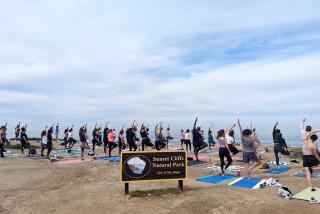Camarillo Goes Easy on Bingo Fans
- Share via
Bingo enthusiasts of Camarillo, take heart.
The City Council has decided to allow nonprofit groups to run up to three games a week, easing its original proposal to limit bingo playing to once a week.
The issue came to a head Tuesday night when three dozen bingo fans descended on a council meeting to object to the stricter plan.
The group complained that the council was about to hamper a popular activity for many of the city’s 8,000 senior citizens.
“It’s more social than anything. You’re not going to win or lose very much,” said Thomas Hughes, president of the Camarillo Seniors Club.
“It’s a place to get together. It means an awful lot to these seniors.”
The council took up the matter after the Ventura County Sheriff’s Department, which serves the city of 45,000, recommended changing the city’s bingo law to block out-of-town groups from setting up games. Under state and city law, only nonprofit groups can run bingo games.
The Sheriff’s Department last month suggested that city bingo licenses only be issued to groups that have worked in Camarillo for at least a year, and that each group be able to conduct one six-hour game each week. There are now no limits on the number of games or hours of play.
Aside from the Seniors Club, groups such as The Boys Club of Camarillo, local PTAs and Leisure Village, a 3,500-resident retirement community, use bingo to raise funds and provide recreation.
“We want to protect the fund-raising capabilities of our local bingo operators. Otherwise, the money leaves town,” Sheriff’s Lt. Michael Pitts said.
But bingo players who congregate thrice weekly at the Camarillo Senior Citizens Center protested the plan, and the council on Tuesday night unanimously gave tentative approval to permitting three bingo sessions a week.
Hughes said 60 to 100 people play bingo at the center Monday nights and Wednesday and Friday afternoons. The camaraderie is invaluable, he said.
“They’re mostly regulars. Many are in poor health and don’t drive. If somebody doesn’t show up, we call and make sure they’re all right,” he said.
More to Read
Sign up for Essential California
The most important California stories and recommendations in your inbox every morning.
You may occasionally receive promotional content from the Los Angeles Times.













